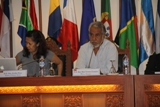Government discusses the outlook of the State Budget: achievements, challenges and preparations for 2012

The Ministry of Finance organized a workshop with the theme "State Budget Overview: achievements, challenges and preparations for 2012." This debate took place at the Dili Congress Centre, from August 1 to 2, with live coverage of TVTL and RTL, and intends that all the organs of sovereignty reflect on the 2011 State Budget, and its implementation while at the same time prepare the year 2012.
The debate was chaired by the Prime Minister, Minister of Finance, Deputy Minister of Finance, Director of Budget and Finance Director General. The opening was made by the Head of Government, which began to speak of the nationalist spirit and responsibility of civil servants and public administration to serve the Nation. He kept referring to the decentralization that the government has done in the sense of giving responsibility and empowering so that they could make a good budget and therefore a good execution. According to the Prime Minister, this is a question that still needs to be taken into account and this was the theme for the opening of the workshop agenda.
The Minister of Finance presented the results from 2008 through 2011, the challenges that are still faced and what is considered important to reform the State budget.
For Emília Pires, since the start of governance, it was possible to obtain peace and stability from the targets, problems were solved with the IDPs and with the petitioners, the veterans, the elderly and vulnerable people were taken into account and there was a significant advance in the economy and economic growth has doubled, the poverty rate began to descend, and reforms were made in State institutions.
Several challenges were, however, identified: further lowering of the poverty rate, the situation of precarious employment and unguaranteed wages, infrastructure (roads, water and sanitation) that are not yet in acceptable condition, the budget dependence on the Petroleum Fund, the limited domestic production (more imports than exports) and also the poor management of the budget.
Within the latter, various situations have been identified such as the failure of the tax package, in the sense that the budget increases without being in accordance with the priorities and needs, and the tendency for debts and then resort to the contingency fund alleging a matter of urgency. In addition to the difficulties of some of the divisions of finance, lack of managers for projects and lack of coordination between Ministers, State Secretaries and Directors, the services are still very time consuming.
The Finance Minister also had the opportunity to talk about the trend expenditure of abuse in the use of government cars and gasoline vouchers, and finally, non-standardization of costs, ie, the cost of projects does not reflect reality.
In conclusion of the first day of this discussion, recommendations were made regarding the reform of the State budget. It is necessary to comply with the tax package to create fiscal discipline and in this regard, the Budget Review Commission will take strong measures to implement the tax package in progress.A good budget plan avoids constant debts and transfers, especially to buy cars, improve the implementation plan and avoid emergencies. It is also important to identify the roles of responsibility from Ministers to Directors, including Vice-Minister, State Secretaries and Director-Generals, so that they distribute the tasks properly and this results in a more effective coordination. Also highlighted was the need to strengthen the financial directorates of all ministries and agencies to devise a good plan, to implement and evaluate the results of the budget.
It was with these alerts that Prime Minister and Minister of Finance ended the first day of this workshop and let each of the organs of sovereignty reflect on its budget to continue the discussion the next day.










































